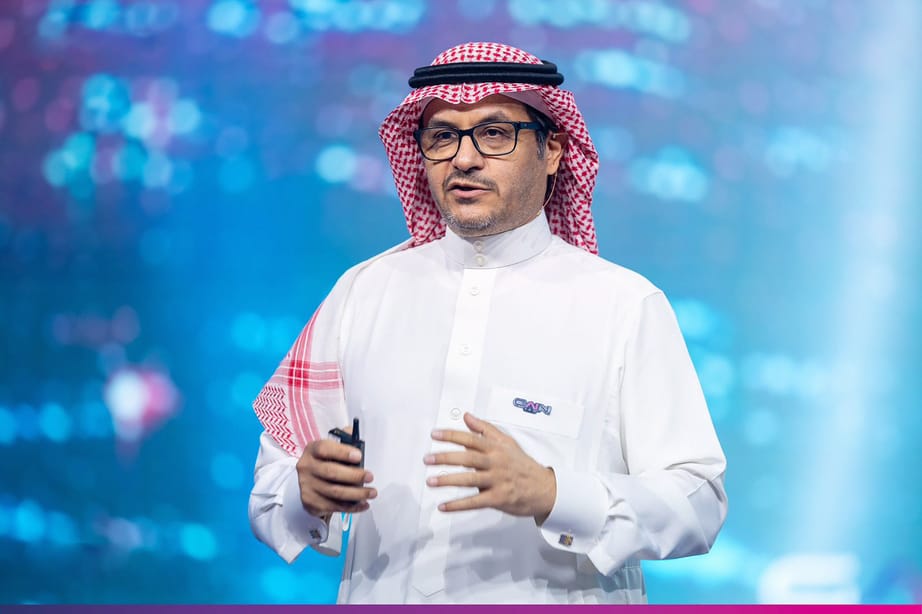
GAME ON SAUDI ARABIA’S JOURNEY TO BECOMING A GLOBAL GAMING HUB IS GOING STRONG
(And its economic impact is set to move from being mere pixels to tangible prosperity) BY DEVINA DIVECHA The global

Saudi Arabia’s AI revolution is only just getting started, says Dr. Yaser Al-Onaizan, CEO of the National Center for Artificial Intelligence (NCAI)
Artificial intelligence (AI) may be the buzzword dominating global conversations today, but Saudi Arabia has been quietly laying the groundwork for its AIdriven future for nearly a decade.
Long before OpenAI’s ChatGPT took the mainstream world by storm, the Kingdom’s Vision 2030 blueprint, which aims to diversify away from on oil revenues, positioned data and AI as cornerstones of its economic transformation.
What once seemed ambitious – and even abstract to some at times – is now materializing at a scale few anticipated, with these efforts aiming to position Saudi Arabia as a global contender in the AI race.
The nation has bet big on digital transformation as a key to the future, and it’s been steadily building the infrastructure, policies, and talent pipeline needed to compete, backed by substantial investments in data centers, supercomputing, and AI research. Most notably, it has heavily invested in AI-powered cities and infrastructure. For instance, NEOM, Saudi Arabia’s $500 billion futuristic city, is being built with autonomous public transit systems, AI-driven traffic management, and predictive energy optimization. At the same time, the Kingdom has also been establishing significant partnerships with a number of global tech leaders, all of which have been fueling its ascent in the AI domain.
The Kingdom’s strategy in AI is now beginning to pay off, with major breakthroughs on the horizon, according to Dr. Yaser Al-Onaizan, CEO of the National Center for Artificial Intelligence (NCAI), a key division of the Saudi Data and Artificial Intelligence Authority (SDAIA).
“When Vision 2030 was published [in 2016], only academics and a few experts were talking about AI,” Dr. Al-Onaizan explained. “People think that AI is just starting in Saudi Arabia, but it’s pretty remarkable that the leadership had already embedded AI and data into the national agenda. This clarity of vision has been instrumental in driving us forward. It’s a multifaceted approach, spanning investment, sovereign AI development, and ensuring AI is actively powering transformation across sectors. It’s not just paying lip service to AI – it’s been real investment, effort, and time spent on ensuring these initiatives succeed. We haven’t seen significant AI applications deployed yet, but there are many works in progress right now. We are seeing the pieces come together. In the next year or two, we will start seeing the outcomes.”
The Middle East is expected to accrue 2% of the total global benefits of AI in 2030, equivalent to US$320 billion, according to PwC. In absolute terms though, the largest gains are expected to accrue to Saudi Arabia where AI is expected to contribute over $135.2 billion in 2030 to the economy, about 12.4% of the gross domestic product (GDP) – a figure that would make it a player on the global stage.
Saudi Arabia’s digital transformation is already a testament to this foresight, Al-Onaizan pointed out, noting that over 95% of public sector services – like passport renewals, driver’s licenses, utilities payments – are now delivered digitally. This government-led digital layer, he noted, puts the country ahead of its peers, and also provides the perfect foundation for AI integration, including the deployment of AI agents in government services, which is on the cards.
“This is a significant advantage,” Al-Onaizan said. “In most Western countries, the private sector is leading AI development. Here, it’s the other way around. The government is leading from the front, pushing digital transformation and putting pressure on the private sector to move in that direction. That, I think, is something you rarely see elsewhere.”
SDAIA is the nucleus of Saudi Arabia’s AI ambitions, overseeing data management, policy, and AI development. Its three arms – the NCAI, the National Data Management Office, and the National Information Center – work in tandem to drive innovation. With Al-Onaizan at its helm, the NCAI focuses on sector-specific challenges, from healthcare to smart cities, and it is working to create AI-powered ecosystems for industries such as finance, logistics, and tourism. “Our mandate is to prioritize use cases, develop national solutions, and upskill talent,” he noted, adding that 39% of government entities in Saudi Arabia are currently using or experimenting with AI.
In the healthcare domain, for instance, Saudi Arabia is leading efforts to integrate AI to assist in diagnostics, administrative workflows, and predictive analytics for disease detection. The KSA Ministry of Health is spearheading a virtual hospital initiative to enable patients in remote areas to consult specialists without traveling. “The idea is that a patient in a remote city doesn’t need to travel to Riyadh or Jeddah to see a specialist,” Al-Onaizan explained. “AI-powered systems can handle preliminary diagnoses and triage cases before a human doctor steps in.”
One of the standout projects that Al-Onaizan highlighted is an AI-driven diabetic retinopathy screening system developed in collaboration with the King Khaled Eye Specialist Hospital. Al-Onaizan said that the system, which scans and analyzes retinal images to detect diabetes-related eye conditions, is currently in clinical trials across 13 clinics. “Diabetes-related eye conditions are a leading cause of blindness in Saudi Arabia,” he said, while underscoring the critical role AI can play in early detection and prevention. “We have about four million diabetic patients, and 20% of them develop diabetic retinopathy.”
Several other use cases for diagnosis and patient engagement are also in development, Al-Onaizan said, which include AI systems to support children with autism. These systems monitor behaviors through cameras, identifying when a child disengages or loses focus, he explained. The AI system then provides stimuli to re-engage them, helping improve interaction and attention.
Meanwhile, in Saudi courts, Al-Onaizan revealed that AI is playing a role in digitizing legal proceedings. “Around 10,000 court sessions are held online daily,” he said. “AI can transcribe these sessions, highlight key details, and expedite case processing. Instead of relying on clerks to manually sift through case files, judges can move seamlessly from one case to the next.”
One of NCAI’s flagship projects is ALLaM, an Arabic large language model designed to cater to regional linguistic and cultural nuances hosted on IBMs’ enterprise AI and data platform, watsonx. “ALLaM is competitive in Arabic language processing, and it will soon be rolled out nationally,” Al-Onaizan revealed.
Al-Onaizan also said that he expects a surge in AI-driven public services over the next few years. “We will see more AI-powered digital assistants in government, predictive healthcare models, and AI-enhanced law enforcement tools,” he predicted. “AI will fundamentally change the way people live their daily lives, and how they interact with institutions in Saudi Arabia.”
Collaborations with global tech leaders are accelerating progress as well. The country has already partnered with tech giants like IBM, Google, Microsoft, Nvidia, Groq, Huawei, and many others. “Saudi Arabia presents a great opportunity for partnerships, not just to sell technology or tap into funding, but to develop, scale, and deploy AI solutions for the whole region,” Al-Onaizan said. “What makes this region attractive is its youthful, techsavvy population. You have audience that is ready to engage. They are not going to adopt AI. They are already doing it. That, I think, creates lots of opportunities.”
But, despite its rapid strides, Saudi Arabia faces hurdles in its AI journey. And Al-Onaizan is candid and cleareyed about the challenges ahead. “I want to be frank: we are not one of the leaders in AI yet, obviously,” he said. “We have infrastructure issues that are still being addressed. And, while there’s plenty of data, access to it for AI consumption is not as easy as it should be, due to bureaucratic hurdles. This is something we’re working on, but we haven’t fully resolved yet.”
Perhaps the most pressing concern, however, is talent. “We have a talent gap,” Al-Onaizan said, noting that despite substantial investments in education, and initiatives to send students abroad to gain global expertise, Saudi’s AI talent pool is still developing. While NCAI boasts a diverse talent pool including engineers, scientists, and technical experts, the country still needs a bigger number and a wider set of experts to meet its growing ambitions.
However, Al-Onaizan noted that AI expertise doesn’t solely stem from computer science. “The main drivers of early AI technology weren’t computer scientists – they were electrical engineers, mathematicians, and physicists, because they understood mathematical modeling and processes,” he explained. “So, we have the ingredients to be good, but we need a concerted effort to consolidate these minds, attract global expertise, and complement them with external expertise.”
Al-Onaizan, a veteran AI expert with two decades of experience at IBM and Amazon Web Services, sees his own journey as proof of Saudi Arabia’s long-term vision in action, bringing global expertise home to drive its AI ambitions forward.
“I am a product of these programs,” he said. “The experience I gained, I’ve brought back to help lead efforts in the country. I am very optimistic, because I am a direct result of the country’s vision. I believe we have what it takes to get there, fast. The best is yet to come.”
Discover the most outstanding articles.اكتشف أبرز المقالات.

Harnessing the power of digital twins to reimagine cities across the KSA and beyond. According to PwC’s 2022 report,

How Riyadh-based The Garage is contributing to a flourishing startup culture in Saudi Arabia In the heart of Riyadh, nestled

Saudi astronauts Rayyanah Barnawi and Ali Alqarni make history in giant leap for the kingdom. From earthbound dreamers to cosmic